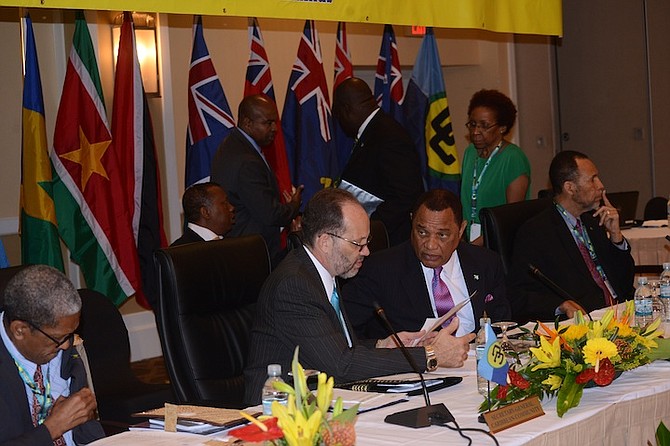By KHRISNA VIRGIL
Tribune Staff Reporter
kvirgil@tribunemedia.net
PRIME Minister Perry Christie yesterday opened the 26th Inter-Sessional CARICOM meeting laying out several strong expectations of commitments from heads of government, chief among them a regional investment in development of human capital.
Mr Christie said it was important to direct major focus on youth empowerment. This comes as The Bahamas battles high youth unemployment that as of November 2014, was 31 per cent for those aged between 15 and 24.
The heads of government will also focus on the move by America to soften an embargo on Cuba announced in December.
Other objectives included an emphasis on energy reform and the domestic economy. The meeting, at the Melia Nassau Beach Resort, saw heads of government of various countries in the region gather for two days of discussion that end today.
“In CARICOM’s ongoing energy talks with the US,” Mr Christie said, “practical areas that the region should negotiate with the US on include the issue of funding without conditionality, the facilitation of the export of liquefied natural gas (LNG) and holding our traditional partner to the stated commitments outlined in the Caribbean Energy Security Initiative of the United States.
“We are acutely conscious of the fact that the energy sector has direct and profound implications for economic development. Most of the Caribbean is non-industrialised and heavily dependent on tourism. Energy costs have a direct affect on pricing and this can affect competitiveness as it relates to the Caribbean’s niche in global tourism.”
Regarding the domestic economy, Mr Christie said the volume of food imports is a challenge for many CARICOM nations. He pointed to the Bahamas Agriculture and Marine Science Institute (BAMSI) as the government’s commitment to food security. The Bahamas spends around $1 billion in food imports yearly.
“The Bahamas imports almost everything that we eat, a situation that is common in many CARICOM nations,” Mr Christie said. “Our annual food import bill is approximately US$1 billion. My government has decided that it is time that we grow what we can and only buy what we must.
“BAMSI is a $20m investment. It will become the tool to demonstrate that we can substantially cut into our huge food import bill. Over the next two years, it is envisioned that we will reduce food import by 20 per cent in as many as 30 imported crops and, in time, through our value added strategy, improve that percentage incrementally.”
Foreign Affairs and Immigration Minister Fred Mitchell told reporters following the opening session of CARICOM that the recent change of attitude to Cuba by the United States has raised questions of economic implications.
“(This) is a significant matter for the region that has obvious economic implications in the sense that there will be a kind of forbidden fruit impact in the first few years of any open relationship with the United States,” Mr Mitchell said.
“So it behooves the region to act in a manner that is strategic. This is what the Prime Minister meant (when he said) that we need to start speaking with Cuba on the synergies that can operate between ourselves and Cuba out of necessity and ensuring that our economies don’t suffer adverse impacts.
“In fact the pie grows bigger by having a larger market. That’s the thought and we should take this opportunity as they are still working out the modalities of their relationship to ensure that our own relationship with Cuba is shored up and the Cubans are happy for that as well.”
Under the new measures, the US plans to reopen its embassy in Havana and significantly ease restrictions on travel and commerce within the next several weeks and months. The New York Times reported that while the embargo against Cuba remains in place, President Obama has called for “serious debate about lifting it.”




Comments
Use the comment form below to begin a discussion about this content.
Sign in to comment
Or login with:
OpenID